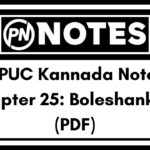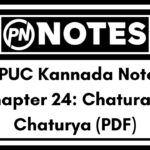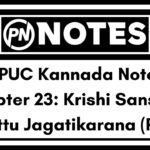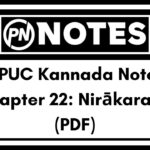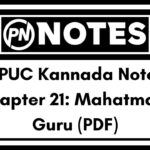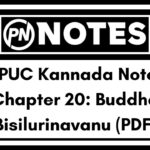Welcome to a different insightful put up in our 1st PUC Kannada Notes collection. On this put up, we are going to talk about Chapter 13: Holige Yantrada Ammi, a thought-provoking poem that delves into the connection between expertise, custom, and human labor. The poem, written by Kuvempu, explores the strain between the normal world and the quickly altering world of machines.
Chapter Overview: Holige Yantrada Ammi
“Holige Yantrada Ammi” interprets to “The Stone of the Holige Machine”. The poem presents a vivid metaphor for the affect of machines and automation on human life, significantly specializing in the conventional stone used to make holige, a well-liked dish, and the way it’s changed by a machine within the trendy age.
Kuvempu brings out the strain between the previous and current, symbolizing the shift from the normal, labor-intensive strategies to the fashionable, machine-driven processes. The poem’s focus is on how expertise alters our on a regular basis lives and the human connection that may generally be misplaced within the course of.
Central Message of the Poem
- The poem emphasizes the affect of expertise on conventional types of labor and craftsmanship.
- It displays the alienation that may happen when machines change human work, particularly by way of private connection and authenticity.
- Machines might enhance effectivity, however they might additionally rob us of the pleasure and private contact that comes with conventional labor.
- The poem serves as a reflection on how we should stability progress with preserving cultural traditions.
Key Lines & Meaning
“Holige yantrada ammi, hadu naaduva”
– That means: The stone of the Holige machine, singing the music of change.
This line refers to how the conventional stone grinder used within the preparation of holige is changed by a machine. The poet means that the music, or soul of the normal course of, is misplaced with the arrival of automation.
“Buddhi doddavaru, kelsa sookshma”
– That means: The mind of the sensible, now working in silence.
This line factors to the truth that though the machine is environment friendly, it operates with out the human connection or the mental involvement that when went into the conventional course of. There’s a sure disconnect between human effort and the product.
Why These Notes Are Important
These 1st PUC Kannada Notes will show you how to:
- Perceive the poem’s commentary on expertise and its results on conventional craftsmanship.
- Put together for short-answer and long-answer questions associated to the poem’s central themes of progress and human labor.
- Mirror on the poet’s critique of how machines can disrupt private connections and the that means present in conventional practices.
- Recognize Kuvempu’s use of symbolism to distinction the conventional and trendy worlds.
Exam Preparation Tips for This Chapter
- Concentrate on the distinction between conventional strategies and the rise of expertise, significantly within the context of human labor.
- Memorize key strains and be ready to elucidate their deeper meanings, particularly how the poem symbolizes progress and alienation.
- Be prepared to debate how Kuvempu critiques the consequences of machines on private and cultural connections.
- Apply writing about how the poem’s message pertains to up to date points round expertise and its affect on conventional crafts and occupations.
Final Thoughts
Holige Yantrada Ammi is a reflective and poignant poem that encourages readers to consider the consequences of technological progress on conventional labor and human connections. By means of Kuvempu’s use of metaphor, the poem reminds us that whereas machines can enhance effectivity, additionally they come at the price of dropping the private contact and authenticity of conventional practices. These 1st PUC Kannada Notes will show you how to higher perceive the poem’s deeper meanings and put together successfully for exams.
More Resources:-

